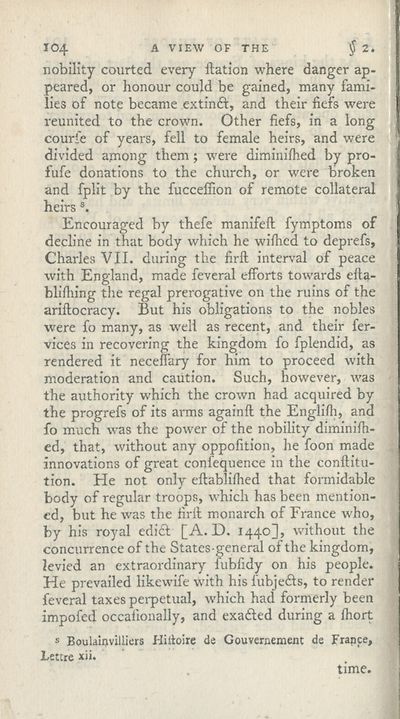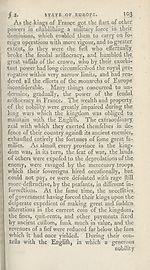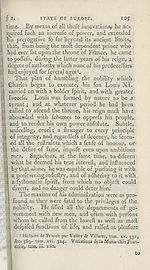Download files
Complete book:
Individual page:
Thumbnail gallery: Grid view | List view

104 A VIEW OF THE § 2.
nobility courted every ftation where danger ap¬
peared, or honour could be gained, many fami¬
lies of note became extinft, and their fiefs were
reunited to the crown. Other fiefs, in a long
courfe of years, fell to female heirs, and were
divided among them; were diminifhed by pro-
fufe donations to the church, or were broken
and fplit by the fucceffion of remote collateral
heirs s.
Encouraged by thefe manifeft fymptoms of
decline in that body which he wifhcd to deprefs,
Charles VII. during the firft interval of peace
with England, made feveral efforts towards ella-
blifhing the regal prerogative on the ruins of the
ariftocracy. But his obligations to the nobles
were fo many, as well as recent, and their fer-
vices in recovering the kingdom fo fplendid, as
rendered it neceffary for him to proceed with
moderation and caution. Such, however, was
the authority which the crown had acquired by
the progrefs of its arms againil the Englifh, and
fo much was the power of the nobility diminifh¬
ed, that, without any oppofition, he foon made
innovations of great confequence in the conftitu-
tion. He not only eftablifhed that formidable
body of regular troops, which has been mention¬
ed, but he was the firit monarch of France who,
by his royal edift [A. D. 1440], without the
concurrence of the States general of the kingdom,
levied an extraordinary fubfidy on his people.
He prevailed likewife with his fubje&s, to render
feveral taxes perpetual, which had formerly been
impofed occafionally, and exatled during a fhort
s BouUinvi!lit:rs Hiltoire de Gouvernement de France,
Lettre xii.
time.
nobility courted every ftation where danger ap¬
peared, or honour could be gained, many fami¬
lies of note became extinft, and their fiefs were
reunited to the crown. Other fiefs, in a long
courfe of years, fell to female heirs, and were
divided among them; were diminifhed by pro-
fufe donations to the church, or were broken
and fplit by the fucceffion of remote collateral
heirs s.
Encouraged by thefe manifeft fymptoms of
decline in that body which he wifhcd to deprefs,
Charles VII. during the firft interval of peace
with England, made feveral efforts towards ella-
blifhing the regal prerogative on the ruins of the
ariftocracy. But his obligations to the nobles
were fo many, as well as recent, and their fer-
vices in recovering the kingdom fo fplendid, as
rendered it neceffary for him to proceed with
moderation and caution. Such, however, was
the authority which the crown had acquired by
the progrefs of its arms againil the Englifh, and
fo much was the power of the nobility diminifh¬
ed, that, without any oppofition, he foon made
innovations of great confequence in the conftitu-
tion. He not only eftablifhed that formidable
body of regular troops, which has been mention¬
ed, but he was the firit monarch of France who,
by his royal edift [A. D. 1440], without the
concurrence of the States general of the kingdom,
levied an extraordinary fubfidy on his people.
He prevailed likewife with his fubje&s, to render
feveral taxes perpetual, which had formerly been
impofed occafionally, and exatled during a fhort
s BouUinvi!lit:rs Hiltoire de Gouvernement de France,
Lettre xii.
time.
Set display mode to:
![]() Universal Viewer |
Universal Viewer | ![]() Mirador |
Large image | Transcription
Mirador |
Large image | Transcription
| Antiquarian books of Scotland > Kings & rulers > History of the reign of the Emperor Charles V. > Volume 1 > (122) |
|---|
| Permanent URL | https://digital.nls.uk/109183795 |
|---|
| Description | By William Robertson. London : Cadell and Davies, 1798. |
|---|---|
| Shelfmark | ABS.1.76.13 |
| Additional NLS resources: | |
| Description | Thousands of printed books from the Antiquarian Books of Scotland collection which dates from 1641 to the 1980s. The collection consists of 14,800 books which were published in Scotland or have a Scottish connection, e.g. through the author, printer or owner. Subjects covered include sport, education, diseases, adventure, occupations, Jacobites, politics and religion. Among the 29 languages represented are English, Gaelic, Italian, French, Russian and Swedish. |
|---|

